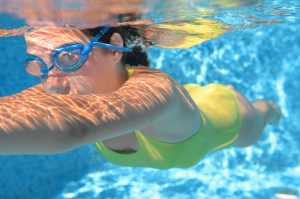Over the years here, we’ve repeatedly touted the benefits of swimming lessons for children on the Autism spectrum. including increased positive changes in overall fitness, functional skills, social skills, and aquatic skills. However, we haven’t specifically addressed the positive effect of aquatic swimming therapy on stereotypical autistic movement behaviors. (Children with an Autism Spectrum diagnosis commonly seek vestibular input using repetitive movements, including swinging, spinning, climbing, jumping, or other rapid movements like the flapping of hands and arms.) (1)
Swimming Therapy for Stereotypical Autistic Behavior
It’s been common knowledge for some time that aquatic therapy has a myriad of positive outcomes for children with ASD. However, in 2004, some researchers set out to determine the specific effects of swimming on motor performance in children with ASD, with the following results. After ten weeks, not only did strength and flexibility increase, so did balance, agility, and power. Also, the number of stereotypic behaviors decreased by about half. These included spinning, swinging, delayed echolalia and no reaction or delayed reaction to a stimulus within 5 seconds. (2)
An additional study done of occupational therapists reported that while reducing stereotypic behaviors was a goal always addressed only half of the time, therapist-reported decrease in stereotypic behaviors reduced across all sessions over 50% of the time. (3)

The literature, while still sparse in this specific area even now, is clear. The natural repetitive motions used in swimming and therapeutic properties of the water can mimic the repetitive and self-soothing behaviors used by children with ASD.
Aquatic therapy for children and adults with an Autism Spectrum disorder offers a definitive decrease in stereotypical autistic behavior, along with the previously discussed benefits of increased cardiovascular health and better overall fitness levels, enhanced social skills, improved aquatic skills, and better adaptation to change.
At One with the Water, our founder, Coach Rippetoe Coach Kenneth has extensive knowledge of the principles used in the field of Applied Behavior Analysis (ABA) and the ethical considerations involved in working with children with autism. Additionally, Coach Rippetoe is a Level 4 Disability Swim Coach certified by the American Swimming Coaches Association.
Register today for our premium swim lessons.
*Sources:
(1) Dickie, V. A., Baranek, G. T., Schultz, B., Watson, L. R., & McComish, C. S. (2009). Parents’ reports of sensory experiences of preschool children with and without autism: A qualitative study. American Journal of Occupational Therapy, 63(2), 172-181.
(2) Yilmaz, I., Yanarda, M., Birkan, B., & Bumin, G. (2004). Effects of swimming training on physical fitness and water orientation in autism. Pediatrics International, 46, 624–626.
(3) Dubois, M. (2011). Aquatic Therapy for Children with an Autism Spectrum Disorder: Occupational Therapists’ Perspectives.https://soundideas.pugetsound.edu/cgi/viewcontent.cgi?referer=https://scholar.google.com/&httpsredir=1&article=1021&context=ms_occ_therapy
Molly is a member of our creative team, mom of four water-loving babies, and a fierce advocate for CPR training and really early swim instruction.
